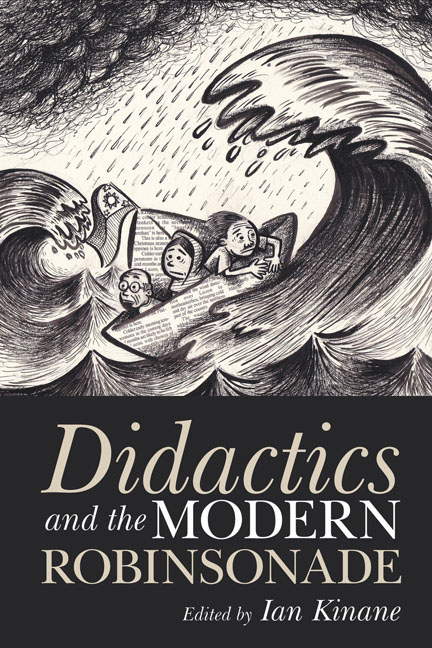Book contents
- Frontmatter
- Dedication
- Contents
- Notes on Contributors
- Foreword: The Progressive Pedagogies of the Modern Robinsonade
- Introduction: The Robinsonade Genre and the Didactic Impulse: A Reassessment
- 1 ‘What a Crusoe crowd we shall make!’: Destabilising Imperialist Attitudes to Space in G. Warren Payne's Three Boys in Antarctica
- 2 Borrowing (from) Crusoe: Library Books and Identity Formation in the Irish Free State
- 3 Navigating Nationhood, Gender, and the Robinsonade in The Dreams of Myfanwy
- 4 Call it Courage and the Survival of the Imperial Robinsonade
- 5 Shifting Perspectives in Two Mid-Twentieth-Century Robinsonades
- 6 Between Communitas and Pantheism: Terry Pratchett's Nation as a Post-Christian Robinsonade for a Postcolonial World
- 7 Romance, the Robinsonade, and the Cultivation of Adolescent Female Desire in Libba Bray's Beauty Queens
- Index
5 - Shifting Perspectives in Two Mid-Twentieth-Century Robinsonades
- Frontmatter
- Dedication
- Contents
- Notes on Contributors
- Foreword: The Progressive Pedagogies of the Modern Robinsonade
- Introduction: The Robinsonade Genre and the Didactic Impulse: A Reassessment
- 1 ‘What a Crusoe crowd we shall make!’: Destabilising Imperialist Attitudes to Space in G. Warren Payne's Three Boys in Antarctica
- 2 Borrowing (from) Crusoe: Library Books and Identity Formation in the Irish Free State
- 3 Navigating Nationhood, Gender, and the Robinsonade in The Dreams of Myfanwy
- 4 Call it Courage and the Survival of the Imperial Robinsonade
- 5 Shifting Perspectives in Two Mid-Twentieth-Century Robinsonades
- 6 Between Communitas and Pantheism: Terry Pratchett's Nation as a Post-Christian Robinsonade for a Postcolonial World
- 7 Romance, the Robinsonade, and the Cultivation of Adolescent Female Desire in Libba Bray's Beauty Queens
- Index
Summary
This chapter contends that Scott O’Dell's Island of the Blue Dolphins (1960) and Michel Tournier's Friday and Robinson (1972) are works of didactic fiction which pose to young readers questions of historical, political, and cultural concern and, moreover, which allow for readers to develop their own critical skills in response to such concerns. I argue that, through the highlighting of reasoned debate, forced shifts in perspective, and a playful exposure of received social laws, Island of the Blue Dolphins and Friday and Robinson are examples of educational literature par excellence, precisely because they engender within the reader the ability to critically analyse, interpret, and independently draw conclusions from the texts’ events.
Firstly, a few words of context. By the mid-twentieth century, the global colonial landscape had shifted considerably. The imperial power which Britain, in particular, had enjoyed since its plantation of Ireland in the sixteenth century and its subsequent expansion into Africa, India, and the Americas, was gradually waning, and with it the period of high empire, which had lasted roughly from the sixteenth to the nineteenth century. The defeats suffered by Britain during the Second World War (which left the country economically bankrupt), as well as the increasingly vocal demands for independence by nationalist movements within several British colonial territories (spearheaded by Mahatma Gandhi's Indian National Congress), meant that British empire was on the decline, and a blanket policy of peaceful disengagement of British forces from these territories was adopted by Harold Macmillan’s conservative government in the 1960s, to ease further hostilities.
Conversely, at a time of wholesale British decolonisation, both the United States and France were engaged in attempts to prop up their imperial superiority in the face of changing winds. Though the United States ostensibly opposed British colonialism (the American Revolutionary War of the late eighteenth century was fought, after all, to establish a republic from British rule in North America), in reality the country was engaged in a cold war with the Soviet Union that sought to keep the expansion of communism in check, and thus very much supported both Britain's and its own continued existence as imperial world powers (Levine, 2007, 193).
- Type
- Chapter
- Information
- Didactics and the Modern RobinsonadeNew Paradigms for Young Readers, pp. 139 - 168Publisher: Liverpool University PressPrint publication year: 2019

